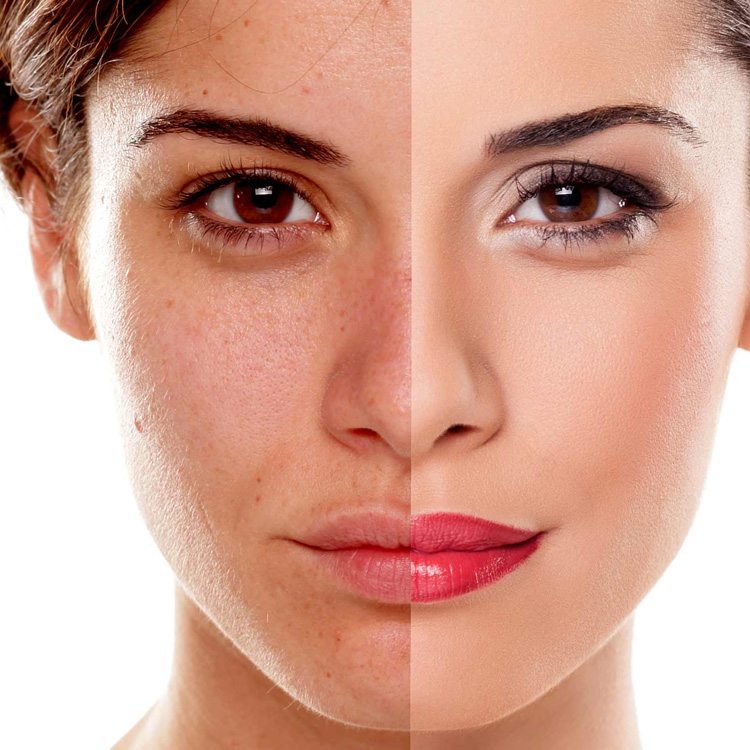
Hyperpigmented skin is not necessarily a medical condition, however, it can indicate an internal metabolic disease or disorder of the skin. It could occur as patches, cover large areas of the skin or affect particular areas like the face. Hyperpigmentation is a common skin problem that makes some parts of the skin look darker than other areas. The excessive production of melanin is the cause of hyperpigmentation.
While it is not harmful, it can be an indication of internal diseases like hormonal imbalance and immunological diseases. Thus, hyperpigmentation treatment by dermatologist is recommended to rule out internal diseases causing the pigmentation. A specialist treartment is required in conditions like lichen pigmentosus or other pathological pigmentary dermatosis.
It is not easy to deal with skin issues, since they can affect your mental health too. So, treat the skin condition immediately with over-the-counter products. If over-the-counter products didn’t work for you, it is best to approach a dermatologist. At Dermi Cure, we have great knowledge and the experience to deal with any kind of hyperpigmentation treatment.
The different types of hyperpigmentation are Melasma, Sunspots and Post-Inflammatory hyperpigmentation.
Melasma a common skin condition, resulting in pigmentary patches on the face. Usually, it occurs due to hormonal changes in women, post-pregnancy, or peri-menopausal.
Acanthosis nigricans appears as pigmentation patches on the neck, around lips and other flexural areas of the skin like the back of thighs, under-arms, etc. It occurs due to insulin resistance in overweight individuals, individuals with diabetes or pre-diabetes, individuals consuming lots of sugar, females with PCOS, etc.
Post-inflammatory hyperpigmentation this occurs following an inflammation on the skin.
Immune-mediated pigmentary diseases such as Lichen pigmentosus, lichenoid dermatitis
Hyperpigmentation can occur in someone due to various reasons. The most common one is prolonged exposure to sunlight. The common causes of hyperpigmentation are Sun Exposure, Drugs and Medical Conditions or hormonal.
Sun Exposure As mentioned, the sun is the most common cause of hyperpigmentation on face and other body parts. This can be prevented by applying sunscreen when going out.
Drugs Reactions to medical drugs can be a cause of hyperpigmentation. Certain chemicals in medicine can induce the skin cells to produce excessive melanin. That is why it is best to consult a doctor before taking any medicine.
Medical Condition Addison’s disease is a rare disease that can also result in hyperpigmentation. It will affect the areas where the skin is exposed more to the sun.
- Depigmenting skin care products
- Chemical peeling for pigmented skin
- Laser treatment for pigmentation
- Mesotherapy
- Derma roller and micro-needling
- Assessment of your skin and evaluating the reasons for pigmentation
- Investigations to rule out internal metabolic disorders resulting in pigmentation
- Prescribing personalized depigmenting skin products to use at home
- Procedural treatments at regular intervals to manage the pigmentation.
Chemical Peels An exfoliation technique to attain rejuvenated skin, which is smoother, more pigment-free, and less wrinkled. In addition to application over face, it can be performed anywhere on the body.
Skin lightening products Derme cure (DC Clinic) uses the safest, healthiest and most effective skin glow products which render the skin, free from tan, dark spots and blemishes. These products are also used to treat post-inflammatory pigmentation.
Derma Roller Also called as micro-needling is a simple instrument that induces collagen production and reduces acne scars, chicken pox scars, fine wrinkles, and stretch marks. It is also sometimes used to induce hair growth in alopecia.
Mesotherapy A novel non-invasive treatment modality in cosmetic medicine, which involves the injection of medicines directly under the skin at the target area. Mesotherapy is the micro-injection of a solution containing conventional medicines, vitamins, minerals, enzymes and amino acids.
Laser The different laser techniques to manage pigmentary skin disease. Commonly carbon peel lasers, photo facial with IPL, q-switched lasers and pico-second lasers are different laser options for pigmentation done at a dermatology clinic